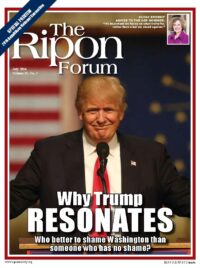 Standing beneath a statue of Ho Chi Minh in Vietnam earlier this year, U.S. president Barack Obama bragged about his ability to ram a rigged, crony capitalist trade deal through a lame duck U.S. Congress.
Standing beneath a statue of Ho Chi Minh in Vietnam earlier this year, U.S. president Barack Obama bragged about his ability to ram a rigged, crony capitalist trade deal through a lame duck U.S. Congress.
“Nothing is easy in Washington these days,” Obama said. “But despite the lack of cooperation with Congress, I seem to be able to get a lot of things done anyway.”
The result of Obama’s imperial presidency? Anemic job growth, lackluster GDP expansion and shrinking income levels. This ongoing economic decline has eviscerated the middle class and dramatically weakened our nation’s position in the world — making us less prosperous and more vulnerable.
As Obama prepares to leave office, his final legacy item — and quite possibly the final nail in the coffin of our free market — is the passage of the Trans-Pacific Partnership (TPP). This proposed global agreement should not be confused with the traditional idea of “free trade” being based upon a mutual lowering of tariffs to increase the flow of goods between two countries. Instead, the TPP is a managed trade deal that rewrites the rules for the world’s economy, seeking to flatten our nation’s regulations and laws, effectively ending economic sovereignty for signatories, all the while ignoring the de facto tariffs that will remain on U.S. goods.
As Obama prepares to leave office, his final legacy item — and quite possibly the final nail in the coffin of our free market — is the passage of the Trans-Pacific Partnership.
While the specific ramifications are still unclear as Congress awaits the presentation of implementing legislation, it is clear that Congress’ ability to make changes to some intellectual property laws and at least some aspects of immigration law would be ceded to the new treaty.
What benefits would ostensibly be derived in exchange for our leaders making these debilitating concessions? Prior to Obama’s visit to Vietnam, the U.S. International Trade Commission (ITC) released a report outlining the “positives” associated with passing TPP. Specifically, the report cited a 0.23 percent increase in annual real income, a 0.15 percent increase in GDP and a 0.07 percent uptick in employment — over the next decade-and-a-half.
Obviously these are not real economic gains, they are rounding errors. Even worse than these status quo stats, though, was the dubious math used in engineering them. For example, the ITC report assumed every American job lost to outsourcing would be replaced — and that foreign currency manipulation intended to disadvantage American goods would not undermine the deal as it has the Permanent Normal Trade Relations deal with China, and the Korean-US free trade deal. The ITC projections also presume that foreign governments will honor the terms of this agreement — and that America will be able to enforce its provisions when they don’t (which they won’t).
These are not just flawed assumptions — they are pure fantasy.
No wonder ITC dramatically missed the mark in projecting outcomes for the 2011 Korean-U.S. (KORUS) free trade deal — which has doubled our nation’s trade deficit with Korea in the span of four short years (costing an estimated 50,000 U.S. jobs in the process).
Obama’s response to this damning data is to ignore it — saying he had “not yet seen a credible argument that once we get TPP in place we’re going to be worse off.”
He’s either lying or he’s not looking very hard.
This deal is clearly not about helping America’s economy — or the workers who derive their livelihoods from it — it is about providing select U.S. companies with access to cheap, overseas labor. In Vietnam, textile workers make roughly $100 a month. By hiring them — or by indirectly benefiting from slave labor in countries like Malaysia — apparel and shoe companies will be able to replace U.S. workers. Just ask the 900 New Balance employees in Maine who will get priced out of their jobs if this deal goes through.
Along with government overtaxing, overspending and overregulation — trade deals like TPP are why the U.S. economy remains stuck in neutral.
Companies outsourcing American positions claim they will make up for the carnage done to our economy by lowering consumer prices — but this promise has proven illusory, too.
“U.S. workers without college degrees have lost roughly 12.2 percent of their wages — even after accounting for the benefits of cheaper imported goods,” columnist Leo Hendrey, Jr. wrote recently for Reuters.
Along with government overtaxing, overspending and overregulation — trade deals like TPP are why the U.S. economy remains stuck in neutral. Growth hasn’t exceeded 4 percent in a decade-and-a-half, and hasn’t eclipsed three percent since 2005. This is the worst economic run since the Great Depression, and recent data points to things getting worse before they get better — even without hanging this millstone around the necks of our workers.
Such is the sad legacy of government-negotiated, centrally planned “free” trade. Frankly, it is past time America’s leaders rebuked it — and stood up to the imperial president looking to foist it upon us as the capstone of his own failed legacy.
Rick Manning is president of Americans for Limited Government.




